One fateful evening, I crashed. If it were not for the skillful surgeon in the emergency room, my foot would have been amputated. Instead, I had several more extensive surgeries and was non-weight bearing and virtually bedridden for over six months.
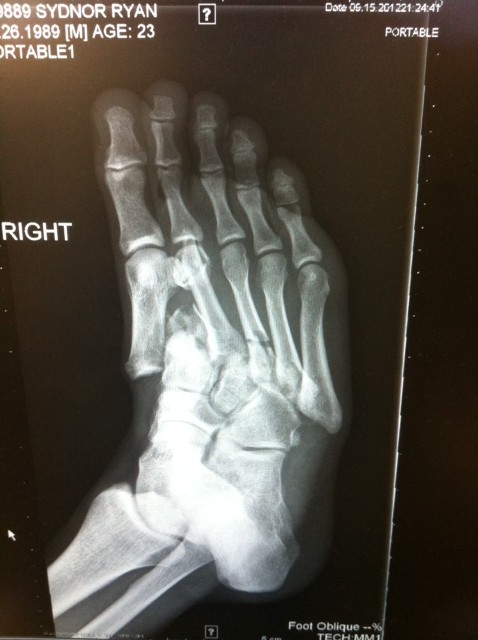
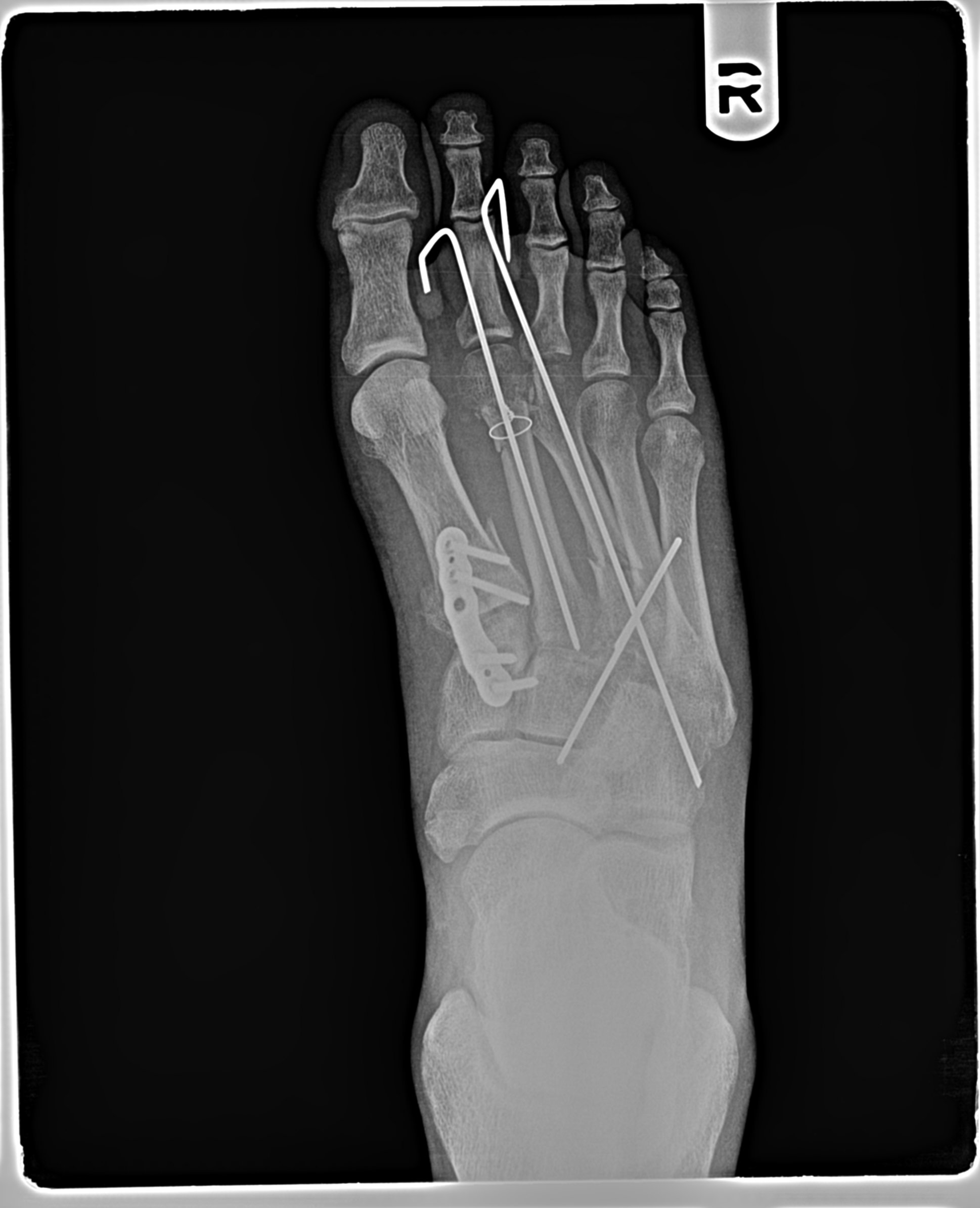
Before and after surgery.
This near-death experience was my wake up call. I realized that I was not yet maximizing my potential and that I needed to focus if I wanted to accomplish my ultimate career goal: becoming the CEO of my own technology company.
The accident happened shortly after I graduated from college, during my fourth month working as a Technology Analyst for Bank of America Merrill Lynch (BAML). My manager told me that I could take disability leave but, instead, I asked him to send me a secure laptop to enable me to work remotely. Though I was bedridden, I resolved to devote myself to both my recovery and work. Determined to overcome the surgeon’s uncertainty about my ability to walk normally again, I went to physical therapy four times a week. While rebuilding my strength, I simultaneously taught myself the tools, languages, and frameworks necessary to create and deliver GIRT, a tool that allowed Financial Advisors at BAML to extract and analyze historical alternative investments’ trade data. My dual focus on both my recovery and career worked. I vividly remember walking into my Director’s office to receive my promotion to Assistant Vice President in half the time it normally takes a Technology Analyst.
 My colleague, Chiranjeeb, and I standing in front of the iconic Merrill Lynch bull just after receiving promotions.
My colleague, Chiranjeeb, and I standing in front of the iconic Merrill Lynch bull just after receiving promotions.
As I led a team to extend GIRT to access data from the entire Global Wealth and Investment Management organization, I thought back to my wake up call. Although I was learning about web technologies and project management, the size and bureaucracy of BAML was inhibiting my potential to grow my career towards my goal of founding a technology company. While injured, I had read The Principles by Ray Dalio, in which he outlines his approach to running Bridgewater Associates (BW), the world’s largest hedge fund. I was captivated but skeptical about the culture Ray had created and I wanted to experience it first hand. I applied to and was hired by BW’s Core Technology department. I was excited that I assimilated into the company’s radically transparent, results-oriented culture outlined in The Principles, which was so different from BAML’s culture.
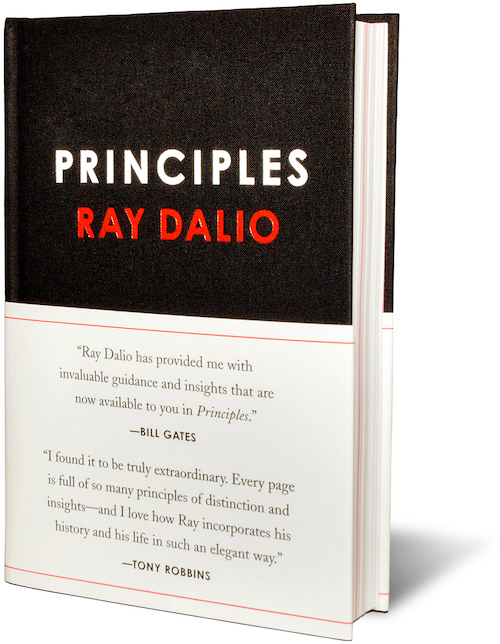 Ray Dalio’s The Principles, originally publish as a PDF on BW’s website.
Ray Dalio’s The Principles, originally publish as a PDF on BW’s website.
I became curious: what were the attributes that comprised a BW culture fit? I began exploring this question on nights and weekends. I utilized employee data to create Unicorn Hunt, an application that allowed BW’s recruiters to target sources of candidates based on attributes that lead to success at BW. Within 10 minutes of sharing my prototype, the Head of Recruiting called me. As I walked towards his office, I saw Unicorn Hunt open on every recruiting analyst’s screen.
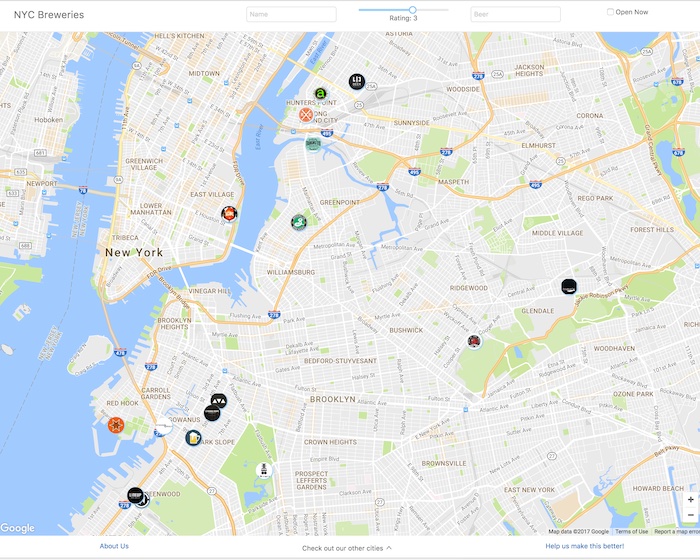 Due to BW’s IP considerations, I cannot include a screenshot of Unicorn Hunt. Instead, I included a screenshot of my project that maps out breweries in NYC, brewery.life, which is inspired by Unicorn Hunt’s real time filtering functionality.
Due to BW’s IP considerations, I cannot include a screenshot of Unicorn Hunt. Instead, I included a screenshot of my project that maps out breweries in NYC, brewery.life, which is inspired by Unicorn Hunt’s real time filtering functionality.
Unicorn Hunt sparked a paradigm shift in the way BW’s recruiters targeted universities, eventually doubling the throughput of BW’s campus hiring pipeline. The initiative I showed in creating an innovative, out-of-the-box solution on my own time earned me a promotion into BW’s new and exclusive technology department, Cloud Enablement (CE). I was excited to expand my technical breadth by collaborating with the firm’s most elite technologists by working on cutting edge cloud technologies and open source software (OSS).
 Collaborating with my team on cloud automation technologies. This image can be found on both Bridgewater’s campus recruiting and technology recruiting websites.
Collaborating with my team on cloud automation technologies. This image can be found on both Bridgewater’s campus recruiting and technology recruiting websites.
A year later, I was leading a CE team to help the firm migrate out of its private data centers and into the cloud serviced by Amazon Web Services (AWS) by contributing to OSS. I realized that the more AWS accounts I had, the more burdensome switching between them became. I brainstormed a solution with my team: leverage an OSS product by another company, Adroll. I formed a strategic partnership with Adroll and executed on our idea: a browser extension named Holochrome.
Initially, Holochrome supported switching between AWS accounts with a few mouse clicks; however, technologists outside of our team did not use it. I recognized that, while Holochrome alleviated some burden, it still required effort. I reduced the interaction to a single keystroke. Within a day, every BW technologist was using Holochrome. I then worked with a designer to create sleek iconography and distributed it via Holochrome’s auto-update feature. I was inundated with positive feedback and realized technologists outside of BW could benefit from Holochrome. I collaborated with my manager and published my first OSS product. Through successful marketing via Reddit, HackerNews, and a presentation at AWS’ Loft in San Francisco, I helped Holochrome acquire its first thousand users. That experience helped me realize that I love creating products from scratch.
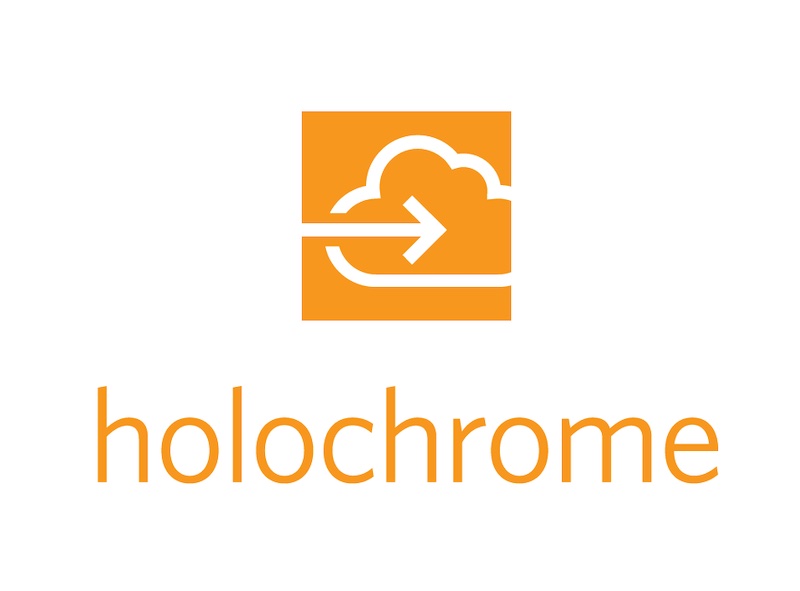
I reached out through my network and found a terrific opportunity at a startup in the vibrant NYC tech ecosystem that aligned with my love for building products. Teachers Pay Teachers (TpT) is the world’s largest educational marketplace where over two thirds of the teachers in the United States buy and sell teaching materials. Within my first few months, I delivered a streaming video product that resulted in 5,000 videos uploaded, built a small team around myself utilizing tools to drive process efficiency improvements, and improved foundational technology by migrating unstable, legacy infrastructure onto more reliable infrastructure that resulted in 5% revenue growth.
An awesome example video product on TpT.
After adding streaming video as a content type, the rate of video uploads was below our expectations. TpT’s small size and limited resources brought out my entrepreneurial spirit. I knew we could only afford to focus on one opportunity at a time. We leveraged what we learned from introducing videos, explored other opportunities, and identified an unmet demand. We pivoted to build bundles: groups of existing products sold at a discount. Today, bundles account for 25% of TpT’s revenue. Delivering bundles helped me realize I have a key entrepreneurial trait: the flexibility to pivot in pursuit of my goals.

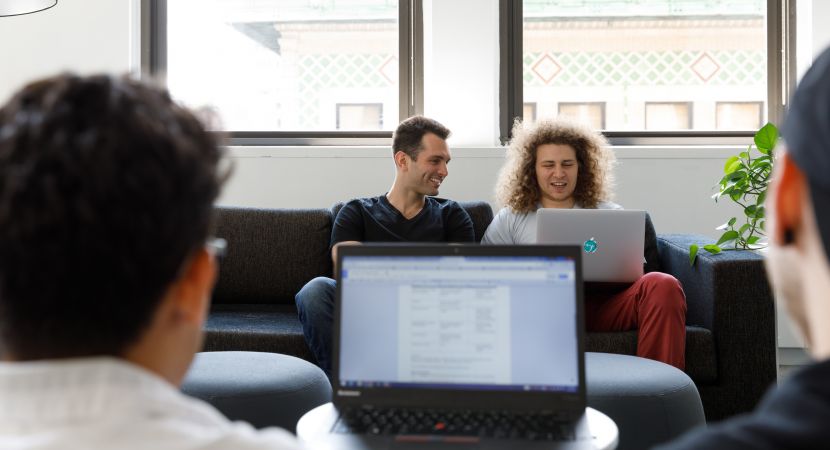
Discussing bundles architecture. Check out an example bundle here. This image can also be found on TpT’s team website.
TpT and I have scaled up together. I have accelerated TpT’s business by 30% through new products. I have helped TpT grow from 80 to 150 employees by building its brand through blogging and making its engineers an integral part of the NYC tech ecosystem. TpT has helped me internalize what it means to be a leader.
I am currently the Technical Lead of a high performing, international, cross-disciplinary team of 10. We are responsible for products that are viewed millions of times per day. This experience was exactly what I was looking for – I am directly responsible for architecting, planning, and building solutions that scale to help millions of educators per day and which account for over 30% of TpT’s revenue growth in 2017.
Since my accident six years ago, I have become deliberate about ensuring that each step I take aligns with my goals. My journey has exposed me to key tenets that I believe are imperative for a founder and CEO. I have demonstrated tenacity in the face of adversity. I have thrived in a results-oriented culture. I have led and scaled teams. I have delivered innovative and creative technology solutions that scale. However, through this process I have realized that there is a gap in my knowledge. I do not have a strong enough understanding of the business fundamentals that are the underpinnings of every product, technical, and organizational decision.
Cornell Tech’s MBA will help me fill my knowledge gap and allow me to further realize my potential. The business fundamentals I’ll learn will prepare me to set a strategic vision grounded in realistic economics, a strong and collaborative organizational structure, and solid technical infrastructure that get people excited to come to work every day. Foundational classes such as “Financial Accounting” and “Marketing Management” will be a great complement to my existing technology and leadership skills that I plan to further hone through courses like “Tech Strategy” and “Leading Teams”. My excitement about the curriculum grew when I came to an information session, took a campus tour, and felt the energy of the Bloomberg Center.
I recognize that a career is a long journey. If given the chance to make Cornell Tech the next step of my journey, I plan to co-found a technology driven startup as the CEO during Studio. It is my dream to continue with my Studio startup, seek advice from the Spinout Clinic, meet future investors in the Spinout Open House, win a Spinout Award upon graduation, and eventually receive funding from the Big Red Venture Fund to support me in building NYC’s next unicorn.